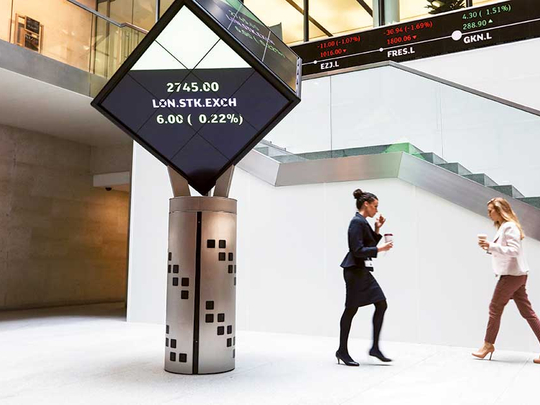
London: Exactly six weeks ago, UK equity traders were waking up to the sight of the FTSE 250 Index plunging the most since 1987. Now even those stocks have put the trauma behind them, with the help of Bank of England Governor Mark Carney.
While the tumbling pound had already propelled the better-known FTSE 100 Index to the biggest advance in major western-European markets this year, Thursday’s boost in stimulus spurred a more broad-based rally. The country’s shares climbed the most following a rate cut since 2001, and the FTSE 250 gauge of mid-sized firms more dependent on the domestic economy extended its advance into Friday to recover all of its losses since Brexit.
Since the June 23 referendum to leave the European Union, large exporters have been the main beneficiaries of the sliding pound, with analysts raising their profit growth estimates for FTSE 100 members at the fastest pace in more than a decade. The BoE’s move has increased speculation that even smaller ones will cope with potentially slower growth.
“The news here is that Carney was very supportive of the domestic economy,” said James Illsley, a fund manager at JPMorgan Asset Management who has allocated about 20 per cent of his UK equity fund to smaller British companies outside the FTSE 100. His firm oversees about $1.7 trillion. “He gave us a very credible and well-thought through package of measures that will immediately benefit the corporate sector. And the bonus is that each of the strands can be expanded and extended as needed.”
The BoE cut its benchmark rate to a record-low 0.25 per cent and expanded its balance sheet by as much as 170 billion pounds ($223 billion), with purchases of government and corporate bonds, as well as a lending program for banks. While the central bank maintained its forecast that the British economy will expand 2 per cent this year, it lowered its 2017 and 2018 projections. The BoE plans to purchase sterling, non-financial investment grade corporate debt “issued by firms making a material contribution to the UK economy.”
At a time of growing scepticism about the efficacy of European Central Bank stimulus, the UK is turning out to be a bright spot. The FTSE 100 recovered from the sell-off following the referendum in just four days, and firms including HSBC Holdings Plc and Citigroup Inc. raised their rating on Britain’s biggest stocks, citing better profit-growth prospects thanks to a weak currency.
Now even mid-cap firms, which sank 14 per cent in the two days after the Brexit vote, have recovered. They’re little changed in 2016, after sliding as much as 14 per cent earlier in the year. By comparison, the regional Euro Stoxx 50 Index has slumped 10 per cent, while the FTSE 100 is up 8.5 per cent.
That’s all good, if you’re a UK investor. For foreign buyers, who make up more than half of the British stock market, the picture doesn’t look as bright. In dollar terms, the FTSE 100 is still down more than 5 per cent since the referendum, while the FTSE 250 has lost 11 per cent.
For now, the BoE’s measures have improved sentiment. Carney said that all elements of the stimulus package can be intensified, including taking the rate close to zero if needed. And traders remain bullish on the UK market, sending the cost of options hedging against swings in the FTSE 100 near the lowest levels in a year versus those on the Euro Stoxx 50. Prices of bullish one-month contracts on the British index are near the highest since 2013 relative to bearish ones.
“This was the second step that investors needed to warm up to the UK stock market,” said Tim Rees, director of UK equities at Insight Investment Management in London. His firm oversees about 400 billion pounds. “It was always likely that large caps would rally on lower sterling and that was quickly repriced. But markets are now also sympathetic to what Carney is trying to do for the domestic economy. Maybe things won’t turn out so bad.”












